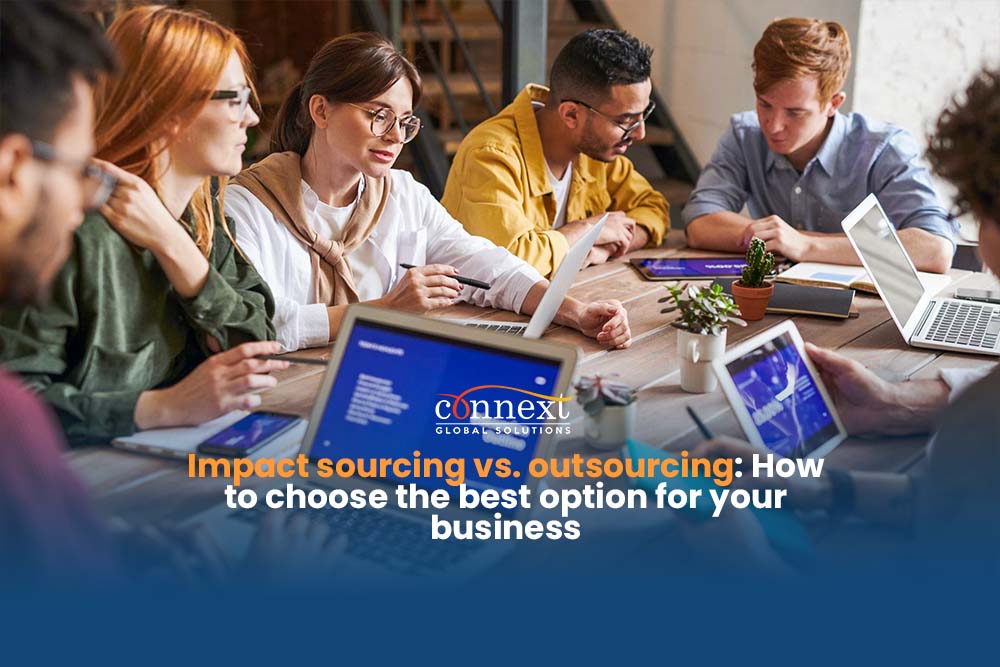The article defines the concepts of impact sourcing vs. outsourcing and how you can choose the best option for your business.

For business owners, deciding which business model to choose is a big decision with implications for your bottom line and our social responsibility. If you are a business owner pondering whether to outsource or engage in impact sourcing for our operations, this blog aims to help you choose the best option for your business.
In this blog post, we’ll discuss the key differences between impact sourcing and traditional outsourcing. By the end, you’ll have the knowledge you need to make an informed choice that aligns with your values and long-term goals.
If you are looking for ways to reduce costs, improve quality, and increase efficiency in your business, you might have considered outsourcing some of your tasks or processes to a third-party provider.
Impact sourcing vs. outsourcing: How to choose the best option for your business Outsourcing
Outsourcing is a common practice that involves contracting out work to an external entity, usually in a different country or region, that can offer lower prices, improved skills, or improved support.
In this model, a business partners with a third-party provider to handle business functions, usually transactional and back-office functions, with the primary goal of reducing the cost of labor done inhouse. Services range from:
Bookkeeping: Outsourced bookkeepers can provide accurate data entry, technical expertise and cash flow management. They provide proper and effective accounts receivable and accounts payable data entry, and documentation to make sure the payments owed by the company and owed to that same company are paid properly and on time.
Order Payment and Processing: Back-office Support Specialists can assist customers on payments and order processing concerns. Inbound customer service outsourcing specialists can assist incoming calls from customers in need of support in order completion.
Transaction Processing: Outsourced Transaction Processors are responsible for reviewing and entering new sales into the internal database. They also read and interpret data on scanned contracts/instructions and any other supporting documents and send out electronic copies of the order documents to clients and other parties involved. They regularly track, review and update the order and other documents or agreements if required.
IT: Businesses can hire technical support specialists with proper technical knowledge to build and deploy a scalable product, and assist and resolve both client and employee-related troubleshooting, or technical to process queries.
Aside from cutting labor costs mentioned earlier, organizations outsource to increase productivity, streamline processes, reduce cost structure, and increase capability, make way for agile operations and solve staffing challenges.
Since you are only outsourcing services in a typical outsourcing model, you cannot define or customize roles apart from the standard outsourcing roles and functions. You also have little or no control over the business processes, no control over staffing and determinants of turnaround time, metrics and the project timeline.
The outsourced team is directly under the management of the provider, and therefore is not fully committed to you. New projects related to your company may be delegated to another team which will mean another round and opportunity cost of onboarding, endorsing, and training.
But outsourcing is not the only option available for businesses that want to leverage the global talent pool and make a positive social impact. There is another alternative that is gaining popularity and recognition: impact sourcing.
Impact Sourcing
Impact sourcing, on the other hand, represents a more socially responsible approach to business operations. Also called “socially responsible outsourcing”, it involves deliberately hiring and training individuals from disadvantaged backgrounds or low-income areas, rural regions, or conflict zones, providing them with meaningful employment opportunities and a pathway to economic independence.
The focus is not solely on cost savings but on making a positive social impact while meeting business objectives. Impact sourcing aims to address social issues like poverty, unemployment, and gender inequality, while also delivering high-quality and cost-effective services to clients.
The Advantages of Impact Sourcing
Impact sourcing has many benefits for both businesses and workers. For businesses, impact sourcing has the following benefits:
Cost & Time Savings: Outsourcing to impact sourcing providers allows for cost and time savings. Impact sourcing can offer competitive prices compared to traditional outsourcing, as impact workers often have lower living expenses and wage expectations.
Improved quality: Impact sourcing can ensure high-quality outcomes, as impact workers are motivated, loyal, and eager to learn and perform well.
Increased Diversity & Inclusion: Incorporating impact sourcing into your strategy promotes workforce diversity, which is increasingly important for businesses. This approach places a strong emphasis on inclusivity and diversity through direct employment opportunities.
However, the impact sourcing model not only benefits businesses but also individuals within disadvantaged sectors who gain meaningful employment at fair wages. It contributes to their well-being by providing them with an opportunity to acquire valuable skills and become self-sufficient.
As more businesses explore alternatives beyond traditional options and embrace impact sourcing as part of their recruitment strategy, they create additional job opportunities for individuals with untapped potential. This benefits both sides: employers receive quality work, and employees gain access to jobs they would otherwise not have.
For workers, impact sourcing can provide:
Increased income: Impact sourcing can provide them with a stable and fair income that can improve their living standards and economic security.
Enhanced skills: Impact sourcing can offer them training and development opportunities that can boost their skills, knowledge, and confidence.
Improved well-being: Impact sourcing can improve their well-being and happiness, as they feel valued, and respected.
As you can see, impact sourcing is a compelling option for businesses that want to outsource their work while also making a difference.
Conclusion
Choosing whether to outsource or engage in impact sourcing for your operations involves making an informed choice that aligns with your values and long-term goals.
Outsourcing is a common practice that involves contracting out work to an external entity, usually in a different country or region to handle business functions, and provide improved skills, or improved support at a lower price.
Impact sourcing, on the other hand, provides cost and time savings, improved quality, and increased diversity and inclusion for businesses. It also benefits individuals from disadvantaged sectors by offering them meaningful employment and opportunities.
When it comes to deciding between impact sourcing and traditional outsourcing, business owners must carefully consider their values, goals, and the potential impact on their bottom line.
Refine your sourcing strategy by understanding all your options. Read our blog post Typical Outsourcing Model vs. Co-Sourcing Model for a comprehensive comparison that will aid your decision-making in ‘Impact sourcing vs. outsourcing: How to choose the best option for your business.’
While outsourcing offers cost savings and access to specialized skills, impact sourcing also offers this but also allows businesses to align with their core values, promote diversity and inclusion, and make a difference. Connext Global Solutions helps companies build custom, dedicated support teams in the Philippines. Start at 1 employee and scale as you need. Learn more about Connext Global Solutions.
Dive deeper into the choice between PEO and EOR in the context of impact sourcing versus outsourcing. Explore our blog post for key insights to guide your business decision.
Follow us on:
Facebook: Connext
LinkedIn: Connext
Instagram: @connextglobalsolutions_
Twitter: @ConnextPh
Gain a clearer perspective on outsourcing and co-sourcing and their roles in your business strategy. Visit our blog to understand which approach aligns best with your goals.









